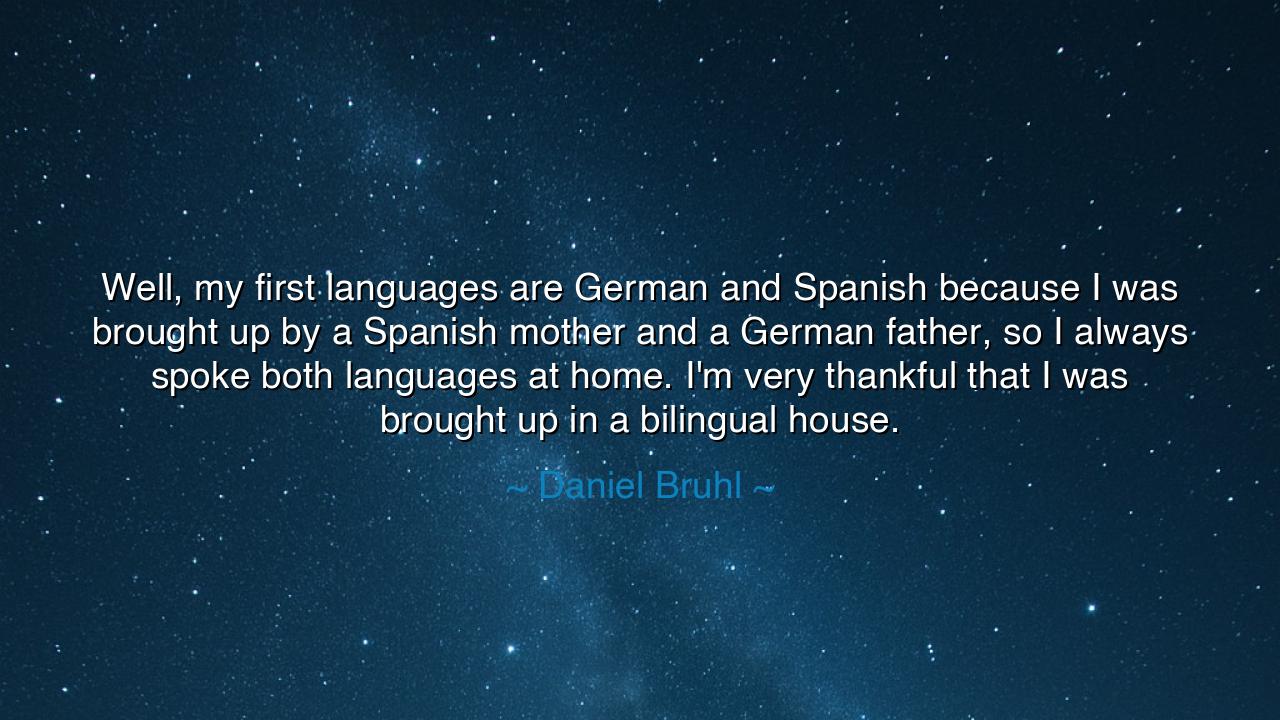
Well, my first languages are German and Spanish because I was
Well, my first languages are German and Spanish because I was brought up by a Spanish mother and a German father, so I always spoke both languages at home. I'm very thankful that I was brought up in a bilingual house.






The words of Daniel Brühl, “Well, my first languages are German and Spanish because I was brought up by a Spanish mother and a German father, so I always spoke both languages at home. I'm very thankful that I was brought up in a bilingual house,” are more than a reflection on family or heritage — they are a hymn to the power of language itself, that most ancient bridge between souls. In his gratitude, we hear the voice of one who understands that to speak in two tongues is to see the world through two sets of eyes, to belong to two melodies at once. It is to live in the meeting place of cultures, where thought becomes fluid and understanding grows deep.
From the dawn of civilization, language has been the thread that binds humanity together. Each tongue carries the spirit of a people — their songs, their sorrows, their laughter, and their dreams. When Daniel Brühl speaks of being raised in a bilingual home, he speaks of being raised between two worlds, two ways of feeling, two ways of knowing. The German mind, shaped by structure and precision, and the Spanish heart, alive with warmth and emotion — both dwell within him. In this union, he embodies an ancient truth: that diversity within the soul is strength, not division.
The ancients, too, revered the power of many tongues. In the time of Alexander the Great, when empires rose and cultures mingled, wise men learned the languages of those they governed, not to dominate, but to understand. Alexander himself, though a Macedonian, spoke in the languages of Persia and Egypt to reach the hearts of the conquered. He knew that language is not only a tool of speech, but a vessel of empathy — for to speak to another in their tongue is to tell them, “I see you; I honor your world.” So too did Brühl’s upbringing gift him this double vision — the ability to move with grace between cultures, to belong to both and yet be bound by neither.
In a bilingual home, a child learns early that the world is not one, but many — that truth wears different faces, and that each word carries shades of meaning untranslatable by sound alone. Such a child grows not only in vocabulary, but in compassion. They understand that the way we say something shapes what it means, that the soul of a people breathes in its language. Brühl’s gratitude — his “thankfulness” — is thus the gratitude of one who has tasted the richness of multiplicity, who knows that every tongue learned is a door opened, every accent carried a song remembered.
Yet the lesson is not his alone. In our own time, when the world grows both vast and divided, the wisdom of the bilingual spirit is needed more than ever. To know another language is to cross the river of misunderstanding. It is to hear the music behind another’s silence. When we learn even a few words of another’s speech — a greeting, a blessing, a thank you — we become less strangers and more kin. As the philosopher Rumi once said, “Raise your words, not your voice. It is rain that grows flowers, not thunder.” So too does language — gentle, shared, and diverse — grow the garden of human peace.
Let us, then, learn from Daniel Brühl’s heritage. Let us see in his bilingual upbringing a symbol of unity amidst difference. For he stands as a child of two nations and a citizen of the world, proof that identity need not be singular to be strong. The world’s greatest bridges are built where rivers meet — and in the meeting of German and Spanish, of logic and passion, we see not conflict but harmony.
So, my listener, remember this: treasure the languages of your home, and honor the languages of others. If you were raised between tongues, count it as a gift of the gods — for you carry within you more than one melody of life. And if you know but one language, seek to learn another, not merely with your mind, but with your heart. For in learning another’s words, you touch another’s soul. As Daniel Brühl’s life shows us, to speak in two voices is to listen twice as deeply — and in that listening, humanity rediscovers its common song.






AAdministratorAdministrator
Welcome, honored guests. Please leave a comment, we will respond soon